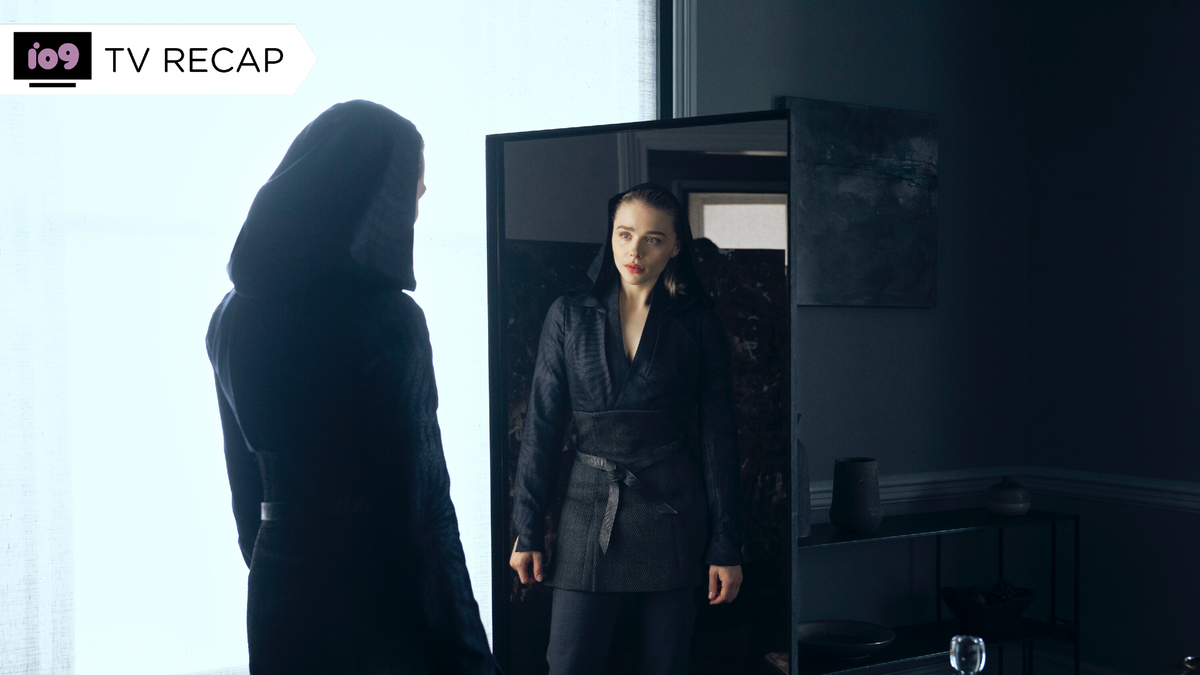
The Peripheral—Prime Video’s William Gibson adaptation from the producers of Westworld—explored some intriguing ideas in its tale of a young woman whose virtual-reality adventuring vaults her into a broken version of the future. But today’s season finale felt like a scramble to the finish; there was too much going on in too little time, with an end that felt too abrupt to be satisfying… and required rewinds to make sense.

“The Creation of a Thousand Forests” isn’t the first time in my Peripheral experience that I had to re-watch scenes to make sure I was interpreting its events correctly—but it was the first time I still wasn’t entirely sure I had things figured out, even after multiple views. When io9 spoke to creator and showrunner Scott B. Smith in October, he explained making The Peripheral a challenging series that demanded close attention was a deliberate choice, and one inspired by its source material: “I think one thing I’ve always loved about Gibson’s work is that it’s not very accessible, and he draws on the reader’s intelligence to build the world. You have to watch how the characters use the terms and you gradually pick it up through that. We wanted that to be similar to the viewing experience—but at the same time, we knew that we couldn’t go too far with that without people just giving up in confusion. So we were trying to walk that line always.”

In an era when an awful lot of pop culture, including TV shows with huge platforms on Prime Video, is calibrated to appeal to the largest audience possible, it’s admirable that The Peripheral didn’t set out to do that. But there has to be a point where things come together and the audience is at least somewhat rewarded for puzzling through the story’s more maddening moments. (If you stuck with Westworld, you know how that feels.) It’s not necessary to spell everything out—it’s almost always better when shows don’t feel the need to insult their audience by doing that—but there’s also the possibility of leaving too many things out of focus. Maybe there was a way to watch The Peripheral and not get hung up on plot points that somehow felt both under-explained and yet crucially important, but that wasn’t necessarily my experience, especially in the final episodes.
G/O Media may get a commission
Part of the problem is that the show tried to do too much; while Chloë Grace Moretz held the center as main character Flynne Fisher—whose simple life in North Carolina, circa 2032, becomes entangled with potentially world-altering events in post-apocalyptic London, circa 2099—The Peripheral grappled with an overstuffed ensemble cast full of people with clashing motivations, not to mention two settings filled with high-stakes schemes and action. It sometimes prioritized certain storylines—like what felt like an entire episode dedicated to a flinty assassin hired by future baddies to kill Flynne and her family—that ultimately went nowhere, at the expense of ones that could have used more fleshing out.
Perhaps reading Gibson’s book before watching the show (which really shouldn’t be a prerequisite for understanding an adaptation) might’ve helped with the show’s murkier areas; though the plots aren’t identical, the novel surely has more detail on, for instance, the not-so-cold-war brewing among London’s three tentpoles of power: the elite “klepts,” the insidious Research Institute, and the all-knowing Metropolitan Police, not to mention the subversive “Neoprims” whose revolutionary rumblings are given short shrift throughout the series despite their last-act importance. The novel may have also helped with the big reveal that felt rushed in the show’s final two episodes, in which we finally learn why Flynne has become such a person of interest in the far-flung future, and do our best to keep up as she plots to “win” what started as a video game, but soon evolved into tangled journey across alternate timelines, with the fate of Flynne’s world—or worlds, rather—at stake.

Perhaps, also, eight episodes wasn’t enough for The Peripheral to do all it wanted to do. It sounds like I’m slamming the series as a whole, but there were high points along the way, including Miller as the fearless Flynne and T’Nia Miller (The Haunting of Bly Manor) as the sinister, impeccably poised head of the Research Institute, whose use of bees as a murder weapon won’t soon leave my nightmares. Still, even its other praiseworthy elements—including its sleek visualization of a tech-powered future in a world that’s rebuilding from near-ruination—can’t prevent the viewer from agreeing with Flynne’s ally, Wilf (Gary Carr), when he remarks that “I keep feeling like I’m missing something obvious.” In the end, just about the only obvious thing about The Peripheral is how badly it wants a sequel. The abrupt conclusion sees Flynne deliberately die in her original timeline so she can “reboot” elsewhere, allowing her the chance to avenge her enemies in the future. And, I guess, ensuring happiness for alt-Flynnes on other timelines? The show cuts off before we see much of that actually happen, instead opting for a post-credits sequence—featuring a bunch of elderly klepts we’ve never met before, threatening villain Lev (JJ Feild) for his involvement in the entire Flynne situation—seemingly engineered to toss one last head-scratcher on the pile.
If The Peripheral does return, it has its work cut out for season two, and maybe with the foundation of season one beneath it, it’ll make for a more enjoyable ride. But is it a ride viewers who lurched through season one will want to take?
The Peripheral season one is now streaming on Prime Video.
Want more io9 news? Check out when to expect the latest Marvel, Star Wars, and Star Trek releases, what’s next for the DC Universe on film and TV, and everything you need to know about James Cameron’s Avatar: The Way of Water.







